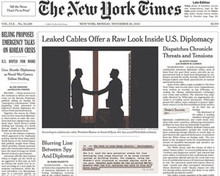 The New York Times partnered with WikiLeaks on its early releases, before falling our with the group
The New York Times partnered with WikiLeaks on its early releases, before falling our with the group The Times was involved in all three of last year's major WikiLeaks releases, the Afghanistan war logs, the Iraq war logs, and the US embassy cables.
Alongside the Guardian and Der Spiegel, the Times was one of the whistleblowing site's initial three media partners, which worked together in London to prepare the release of the Afghanistan leak.
According to a release from the University of Oregon, where the Payne awards will be presented on 20 April, judges praised the newspaper and its editor Bill Keller for treating WikiLeaks editor-in-chief Julian Assange as a source rather than a partner, for consulting with the US government before publication, and for explaining its process to the public.
The Times was also cited for its "thoughtful, carefully calculated" handling of the sensitive documents, which were understood at the time to contain information that could endanger the lives of sources and informants.
“We cannot overestimate the political pressures from all sides," the judges said. "In certain cases, lives were at stake. The Times took the time and resources to do a magnificent job with their investigation and reporting. It would have been very easy, considering what was already being published online at that time, to take shortcuts or limit the scope. The Times made thoughtful, carefully calculated, and line-by-line decisions on what they would print and why.
"To take people through those leaked documents – as well as through the paper’s process in dealing with them – was not only an amazing act of public service, but a fabulous service to journalists all over the United States. WikiLeaks is a harbinger of things to come, and the New York Times handled it well."
The Times' cautious approach to WikiLeaks' raw data was not as well regarded by the whistleblowers' site however. The newspaper refused to link to the WikiLeaks site in its online coverage because it believed that the group had not been stringent enough in removing potentially life-threatening information.
The Times also ran a heavily critical, front-page feature on WikiLeaks editor-in-chief Julian Assange, entitled "Assange on the run, trailed by notoriety".
The newspaper was subsequently cut out by WikiLeaks as a media partner, and forced to obtain a copy of the US embassy cables from Guardian investigations editor David Leigh.
Keller suggested in January that the Times was considering creating its own in-house WikiLeaks to encourage whistleblowers to come directly to the Times in the future.
The other recipient of a 2011 Payne Award was Stanley Nelson, editor of Ferriday weekly newspaper the Concordia Sentinel, for his "cold case" investigation into the 1964 murder of Frank Morris, a black Ferriday businessman.
New York Times photographer Damon Winter will receive a special citation for his documenting of the aftermath of the January 2010 Haiti earthquake.
Free daily newsletter
If you like our news and feature articles, you can sign up to receive our free daily (Mon-Fri) email newsletter (mobile friendly).
Related articles
- The legacy of WikiLeaks, with award-winning journalist James Ball
- Axel Springer CEO on OpenAI deal: 'We must protect intellectual property of news content'
- Audiences, AI and audio apps: five talking points from Perugia
- From Reuters to The New York Times, Big Oil pays 'most trusted media brands' to push greenwashing
- Four digital media trends to watch: generative AI, Gen Z, business models and news formats











